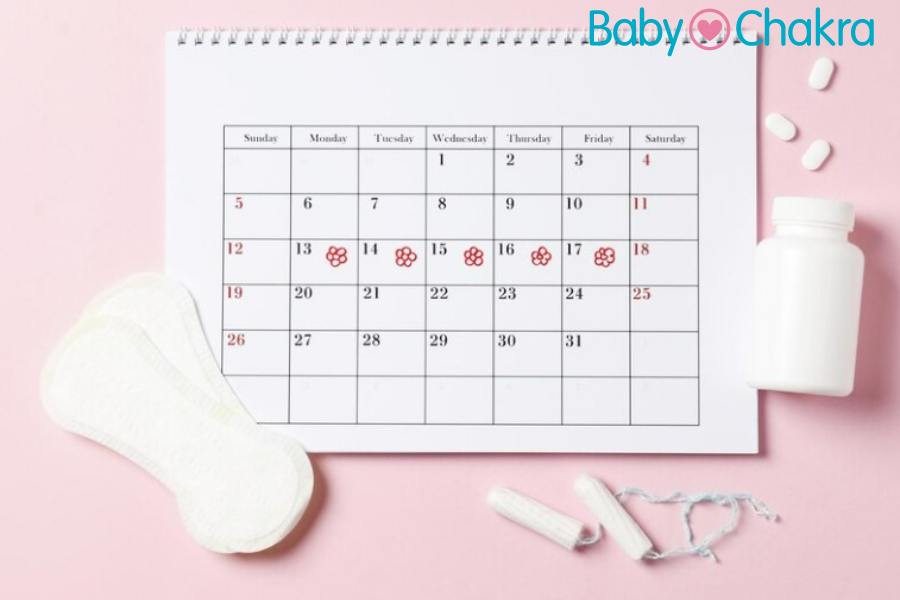
PMS Vs. Pregnancy Symptoms: The Right Way To Tell The Difference
21 Dec 2022 | 5 min Read
Sudeshna Chakravarti
Author | 799 Articles
Premenstrual syndrome (PMS) is a group of symptoms linked to your menstrual cycle. These symptoms are typically experienced during the period between your ovulation and the start of the menstrual flow and affect your psychological, physical, and emotional status.
Some symptoms of PMS can be very similar to the early signs of pregnancy. This can make it difficult to distinguish between the two, and leave you confused. One of the main differences between the two is that the PMS symptoms usually last for about 5-12 days, and disappear once your period starts. But this not be the case with pregnancy symptoms. So read on learn how to differentiate between PMS vs. pregnancy symptoms and what similarities you can expect.
PMS vs. Pregnancy Symptoms: How to Tell the Difference
Bleeding
PMS: You may not experience any spotting or bleeding until your period starts. Once your period starts, you might have heavier bleeding for up to a week.
Pregnancy: You may notice light spotting (dark brown or pink) at the time of implantation, which happens 6-12 days after conception when the embryo attaches itself to the uterus. It may last only for a couple of days and is shorter than a menstrual period.
Nausea and Vomiting
PMS: While vomiting is not a prominent PMS symptom, you may, in some cases, experience nausea before your period begins.
Pregnancy: Most women experience nausea during early pregnancy. This symptom may appear any time after 2-8 weeks post-conception and might continue throughout pregnancy. It is also commonly referred to as morning sickness and might occur at any time during the day.
Fatigue
PMS: Exhaustion is a common PMS symptom, which usually disappears once your period starts. You can deal with fatigue by exercising regularly, maintaining proper hydration, and consuming a balanced diet.
Pregnancy: If your period is delayed, and you are experiencing extreme fatigue, chances are you are pregnant. This symptom may last throughout your pregnancy and is mostly caused due to the surge of progesterone levels in your body, which further leads to a drop in your blood pressure and sugar levels. Good nutrition, deep breathing exercises, and drinking adequate water throughout the day can help tackle this symptom.
Pelvic or Abdominal Cramping
PMS: Cramps, also known as dysmenorrhoea, are common during PMS and its severity varies according to your body’s genetic disposition and system. However, as your period starts, the pain decreases and slowly decreases as your flow ends.
Pregnancy: When the fertilised egg embeds into your uterine wall, it may cause mild abdominal cramping and spotting. You may experience these cramps in your lower back or lower stomach, which may continue for weeks, and even months, lasting much longer than PMS cramps.
Similarities Between PMS and Pregnancy Symptoms
Both PMS and pregnancy have certain similar symptoms that can make it difficult for you to whether it’s an upcoming period, or you are pregnant. These common signs include
- Headcahes: Headaches and migraines are both prominent before the period and during pregnancy. It is usually caused due to hormonal imbalances in your body.
- Back pain: You may have back pain when your period is nearing, and also when you are pregnant.
- Constipation: In the second half of your menstrual cycle, your body produces an excess of the progesterone hormone, which leads to digestive issues such as constipation. Additionally, hormonal fluctuations during early pregnancy could cause constipation as well.
- Increased urination: You are likely to experience frequent urination as you near your period, as well as during early pregnancy.
- Swollen and tender breasts: You might experience breast pain and soreness both during your period and early pregnancy.
Unique Pregnancy Symptoms that are Less Likely to Occur During Pregnancy
Some symptoms are only specific to pregnancy, and may not appear as your period nears. These include
- Darkening of your nipple: As your pregnancy progresses, your body produces an excess of oestrogen hormones, further expanding your areola size or nipple. This development leads to the darkening of the areola, which may remain that way even after your delivery.
- Changes in your cervical mucus: One of the common indications of ovulation is changes in your cervical mucus. If you have conceived, then the mucus will appear white, milky, and thin. In some cases, it could appear sticky as well.
- Shortness of breath: You may experience shortness of breath as the growing uterus pushes up your abdomen, thus reducing the space for oxygen exchange.
- Increase in your basal body temperature (BBT): If you are pregnant, your basal body temperature (BBT) will slightly increase between 0.5-1.5°F shortly after ovulation and continues to be high even during pregnancy.
Conclusion
Knowing in-depth about PMS vs. pregnancy symptoms can help you distinguish between the two better and avoid unnecessary concerns. While most PMS and pregnancy symptoms are alike, some of them are more prominent when you are expecting. Additionally, certain symptoms only appear when you have conceived. So keep an eye out for these unique symptoms and consult your healthcare provider if you have any concerns.
Cover Image Credit: Freepik.com
A


Related Topics for you
Suggestions offered by doctors on BabyChakra are of advisory nature i.e., for educational and informational purposes only. Content posted on, created for, or compiled by BabyChakra is not intended or designed to replace your doctor's independent judgment about any symptom, condition, or the appropriateness or risks of a procedure or treatment for a given person.
